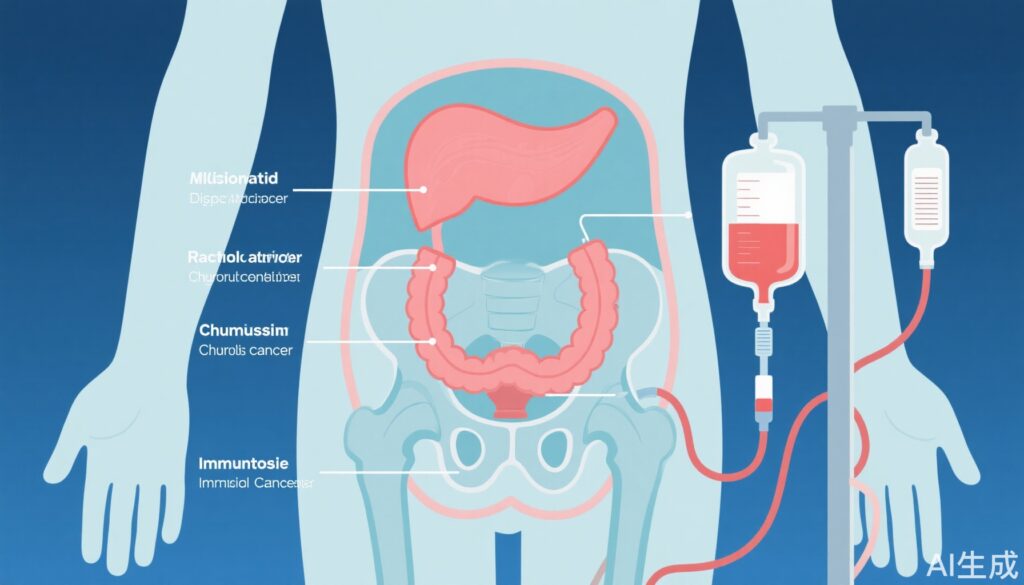Highlights
1. The SPRING-01 phase 2 trial demonstrated that total neoadjuvant therapy combining short-course radiotherapy, sintilimab (a PD-1 inhibitor), and capecitabine-oxaliplatin substantially increased pathological complete response rates compared to chemotherapy alone in locally advanced rectal cancer.
2. The regimen’s safety profile was manageable, with similar rates of grade 3-4 adverse events between groups, though serious adverse events were higher with immunotherapy.
3. The trial provides compelling evidence for incorporating immunotherapy into neoadjuvant protocols for select rectal cancer patients.
Clinical Background and Disease Burden
Colorectal cancer remains a leading cause of cancer morbidity and mortality worldwide. Rectal cancer, particularly in its locally advanced forms (clinical T3-4 or N+), poses significant therapeutic challenges due to risks of local recurrence, metastatic progression, and treatment-related morbidity. Standard management has evolved to include neoadjuvant chemoradiotherapy, primarily to improve resectability and reduce recurrence. However, pathological complete response (pCR)—a surrogate for durable disease control and improved survival—remains suboptimal in many patients. There is a clear unmet need for strategies that can further enhance tumor response, downstaging, and ultimately long-term outcomes.
Research Methodology
The SPRING-01 study was a single-centre, open-label, phase 2, randomized controlled trial conducted at Shandong Provincial Hospital, China. Eligible patients were aged 18-85 years, had biopsy-proven, treatment-naive, locally advanced rectal adenocarcinoma with at least one high-risk feature (T3-4, N1+, extramural vascular invasion, mesorectal fascia involvement, or lateral lymph node metastasis), and an ECOG performance status of 0-1.
Participants were randomized (1:1) to two arms:
– Experimental Arm: Short-course radiotherapy (5 × 5 Gy over 5 days) followed by six cycles of capecitabine-oxaliplatin and sintilimab (200 mg/m2 every 3 weeks).
– Control Arm: Short-course radiotherapy followed by six cycles of capecitabine-oxaliplatin alone.
Both arms underwent total mesorectal excision (TME) surgery 2-3 weeks after completing systemic therapy. The primary endpoint was the pCR rate in the intention-to-treat population. Secondary endpoints included postoperative complications, adverse events, and serious adverse events. Pathological and data analyses were blinded to allocation.
Key Findings
Of 116 patients screened, 98 were randomized (49 per group). The study population was predominantly male (69%) and all participants were Asian, reflecting the local demographic. Median follow-up was 25 months (IQR 20-32).
– The pCR rate was 59.2% (95% CI, 45.4-72.9) in the sintilimab plus capecitabine-oxaliplatin group versus 32.7% (95% CI, 19.5-45.8) in the control group (p=0.015), a statistically and clinically meaningful difference.
– Postoperative complications occurred in 24% of patients in the experimental arm versus 11% in the control arm.
– Treatment-related adverse events were common (over 90% in both arms), with grade 3-4 events in 33% (sintilimab group) and 35% (control group); thrombocytopenia was the most frequent severe toxicity.
– Serious adverse events were higher in the sintilimab group (31% vs 18%). One treatment-related death occurred in the control group (septic shock due to ileus); none occurred in the sintilimab group.
Overall, adding sintilimab to total neoadjuvant therapy increased pCR by 26.5 percentage points, a result that stands out in the rectal cancer neoadjuvant landscape.
Mechanistic Insights and Biological Plausibility
Immunotherapy using PD-1 inhibitors such as sintilimab has revolutionized cancer care, particularly in tumors with high mutational burden or mismatch repair deficiency. Radiotherapy is known to augment tumor immunogenicity, potentially increasing infiltration by cytotoxic T cells and enhancing antigen presentation. The synergistic effect hypothesized between radiotherapy and PD-1 blockade aims to convert the immunologically “cold” tumor microenvironment of most rectal cancers into a “hotter,” more responsive phenotype. The observed increase in pCR supports this mechanism, although further translational studies are needed to clarify predictive biomarkers of response.
Expert Commentary
Current guidelines from organizations such as NCCN and ESMO recommend multi-modality neoadjuvant approaches for locally advanced rectal cancer but do not yet endorse immunotherapy outside of the mismatch repair-deficient context. The SPRING-01 trial contributes important prospective data supporting immunotherapy’s role in a broader patient population.
In expert opinion, the impressive pCR rates are clinically meaningful, as pCR correlates with reduced recurrence and improved long-term survival. Nevertheless, the increase in postoperative and serious adverse events warrants careful patient selection and vigilant perioperative management.
Controversies and Limitations
SPRING-01 was a single-center, open-label study with a relatively modest sample size and an ethnically homogenous (Asian) population, which may limit generalizability to other settings. The open-label design could introduce biases in perioperative management, although blinded pathological review was employed. Longer-term survival and quality of life data are not yet mature. Additionally, the incremental toxicity of adding immunotherapy, particularly regarding perioperative complications and immune-related adverse events, requires further study. The trial did not stratify by molecular subtype (e.g., mismatch repair status), which may influence immunotherapy responsiveness.
Conclusion
The SPRING-01 trial provides robust evidence that total neoadjuvant therapy with short-course radiotherapy, sintilimab, and capecitabine-oxaliplatin significantly improves pathological complete response rates in locally advanced rectal cancer, with an acceptable safety profile. These findings support further investigation in larger, multi-center randomized trials and suggest a potential paradigm shift in neoadjuvant management, particularly for patients at high risk of recurrence. Future research should focus on biomarker-driven patient selection, long-term outcomes, and strategies to mitigate toxicity.
References
1. Tian F, Dai H, Sha D, Yu Y, Jing H, Sun C, Shang L, Liu Y, Feng R, Li J, Liu H, Chen Y, Shi Y, Wang J, Zhuo H, Zhang X, Lian G, Chong W, Chen H, Yang Z, Li L, Jing C. Total neoadjuvant treatment with short-course radiotherapy followed by sintilimab plus capecitabine-oxaliplatin versus short-course radiotherapy followed by capecitabine-oxaliplatin in patients with locally advanced rectal cancer (SPRING-01): a single-centre, open-label, phase 2, randomised controlled trial. Lancet Oncol. 2025 Aug;26(8):1043-1054. doi: 10.1016/S1470-2045(25)00286-4. Epub 2025 Jul 8. PMID: 40645192.
2. National Comprehensive Cancer Network. NCCN Clinical Practice Guidelines in Oncology: Rectal Cancer. Version 2.2024.
3. Glynne-Jones R, Wyrwicz L, Tiret E, et al. Rectal cancer: ESMO Clinical Practice Guidelines for diagnosis, treatment and follow-up. Ann Oncol. 2017;28(suppl_4):iv22-iv40.


